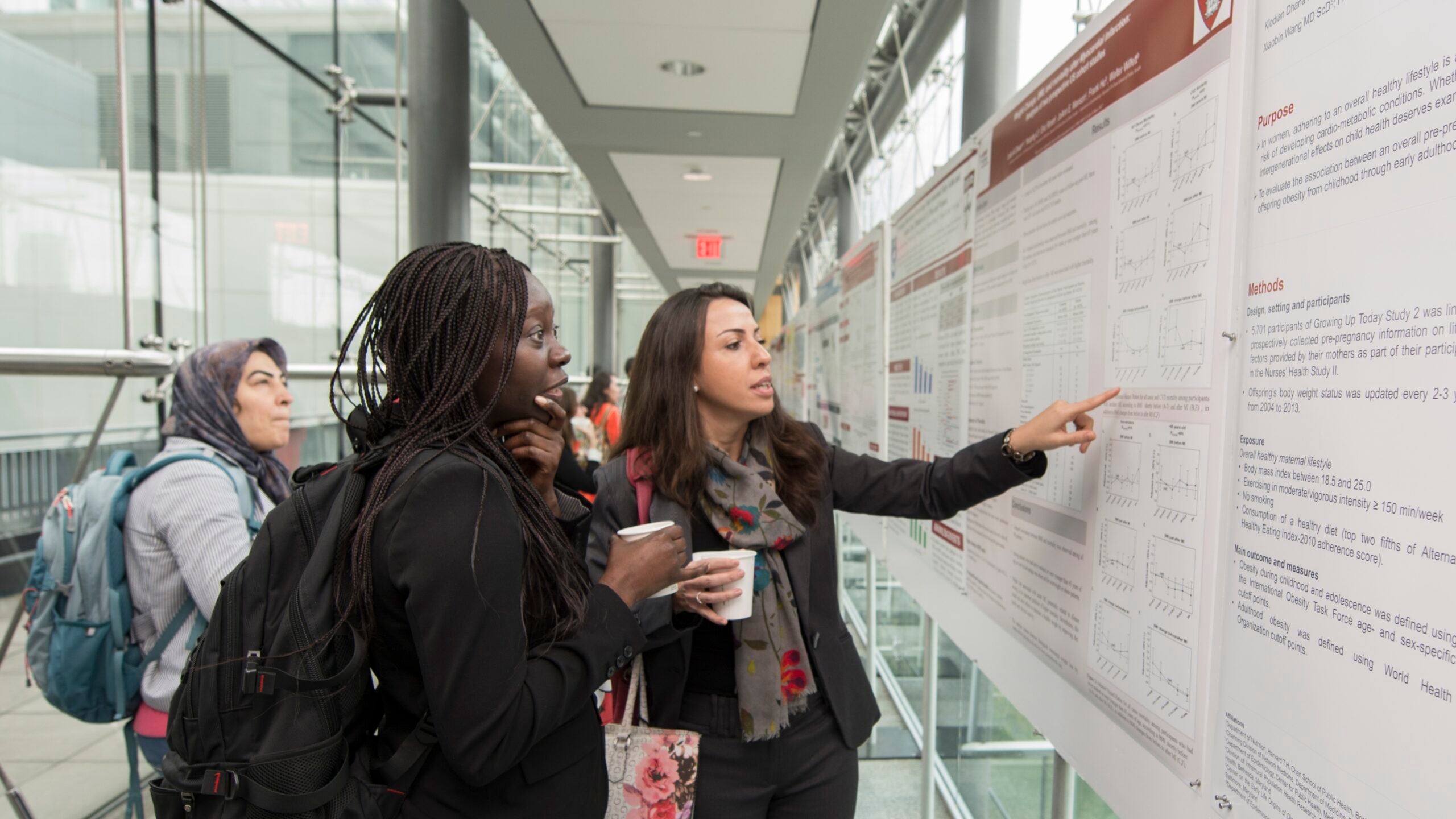Department of Nutrition
We research how nutrition affects human health at molecular and population levels to shape public policy and help people make better diet and lifestyle choices.
665 Huntington Avenue
Building 2
Boston, MA 02115

Fellowships
Postdoctoral Training Grant in Academic Nutrition
The Postdoctoral Training Grant in Academic Nutrition brings together the intellectual and physical resources of the Harvard Chan School of Public Health and Harvard Medical School, fostering close interactions between trainees and faculty. The Principal Investigator, Dr. Frank Hu, and Co-Principal Investigator, Dr. Christopher Duggan, have established strong and vigorous pre- and postdoctoral programs. The training grant program has successfully recruited an outstanding cadre of applicants including ScDs, PhDs, and MDs who demonstrate intellectual promise and dedicated commitment to nutritional science research.
Our program provides training in four key areas: Precision Nutrition (Genomics/Metabolomics/Microbiome), Human/Clinical/Global Nutrition, Nutritional Epidemiology, and Public Health Nutrition. Our overall goal is to incorporate concepts, approaches, and scientific tools from both basic and applied science so that trainees are able to transcend conventional specialty boundaries.
We have created a highly integrated program to fulfill the training needs for nutritional scientists in the 21st century. This training grant program is designed for doctoral graduates and physicians. All trainees participate in nutritional research guided by scientists who are at the cutting edge of their fields. Graduates of this program have established a strong record of publication and success in obtaining grants.
Postdoctoral fellows (PhD, MD, or MD-PhD) will enter training under direction of a Supervisory Review Group and an appropriate preceptor will be selected according to the research interests of the trainee. Fellows may elect training in Nutritional Biochemistry, Human/Clinical Nutrition, Nutritional Epidemiology, and Public Health Nutrition with the Preceptors. It is a premise of our program that an individual committed to becoming an independent investigator is expected to fulfill three years of laboratory/clinical experience as a minimum period of training. Support for this training will be provided by the training grant. We anticipate that MD fellows in the Human/Clinical Nutrition training track will enter the program after a year of subspecialty training in gastroenterology, infectious disease, endocrinology, etc. Trainees never have night-call or other primary clinical duties: these needs are met by fellows in their clinical year of training prior to entering the program.
For those individuals wishing to maintain some continuity in clinical activity, no more than 10% effort will be directed toward clinical work (generally limited to a single three-hour outpatient clinic/week, attendance at weekly Grand Rounds, and occasionally a procedure needed by a patient seen in the outpatient clinic). It should be emphasized that this program is not designed to prepare individuals for practice and requires the demonstration of a high level of commitment (i.e., a minimum of three years in which primary clinical activity is <10% of total effort), with rigorous monitoring to ensure that the individual is pursuing a rigorous course of training. This will be accomplished by periodic reviews carried out by the Supervisory Review Group. This committee, with members constituted from preceptors associated with the Program, will meet with the Trainee twice a year to review the individualized training plan. A written evaluation will be prepared and presented to the Executive Committee for review as part of the Program’s commitment to ongoing monitoring throughout the course of training.
All fellows entering the training Program are required to attend the Harvard Human Nutrition Seminar Series, which provides a format for discussion of basic research, and epidemiologic and clinical approaches to problems in human nutrition. Ample opportunities to attend workshops and interdisciplinary seminars are also provided, including the Nutritional Biochemistry and Nutritional Epidemiology series. Trainees are also expected to attend weekly laboratory meetings and journal clubs under the supervision of their chosen preceptor.
- For fellows entering the training program who do not elect to pursue a degree, we provide tuition to cover expenses for enrollment in two basic science courses, either from the advanced Nutritional Biochemistry or Nutritional Epidemiology tracks as noted above.
- For MD fellows electing the Human/Clinical Nutrition track to prepare investigators for careers in substantive quantitative clinical research we provide a distinctive program developed at the Harvard Chan School.
U.S. citizens, non-citizen U.S. nationals, or those lawfully admitted for permanent residence. Individuals who have been lawfully admitted for permanent residence must have a currently valid Permanent Resident Card (USCIS Form I-551) or other legal verification of such status.
Trainees seeking a PhD or DSc degree must apply directly to either the Harvard Chan School of Public Health or Harvard Medical School and pass the rigorous review process. MD trainees seeking a Master’s degree in Clinical Effectiveness must apply directly to the Harvard Chan School to undergo a similar review of their candidacy. Otherwise, two primary pathways for entry of postgraduates into the training program will be permitted:
- application to the Program Director or Executive Committee without a predefined mentor; or
- direct contact with a given preceptor who may then present the fellow to the Executive Committee for review.